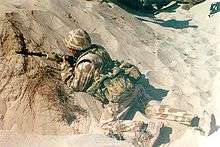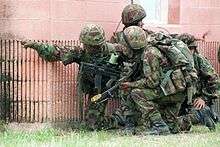Mk 6 helmet

The Mk 6 helmet was the standard combat helmet of the British Armed Forces. The Mk 6 replaced the Mk IV helmet (more correctly titled - Helmet Steel MK IV, General Service). The jump in MK numbers is thought due to the confusion surrounding the MK IV helmet utilising the MK V lining, introduced in 1959. Reference to the British army Catalogue of Stores and Ammunition and Ordnance (editions May 1976, June 1984 and Nov 1985) confirms that the last version of the steel GS helmet was titled the MK IV. The MK 6, introduced into service from 1985, is designed to accept modern ear protection, personal radios, and respirators. The helmet is manufactured by NP Aerospace,[1] and is reported to have an "almost unlimited service life" by the manufacturer.
The helmet in its default configuration is a dark green. The army use covers to camouflage the helmet and adapt it to different environments. Covers include the British Disruptive Pattern Material in temperate, woodland and desert patterns, a pure white cover for arctic environments and a United Nations blue coloured cover. It is sometimes referred as the "battle bowler", a term first used for the Brodie helmet.
The Mk 6 is often mistakenly thought to be made out of kevlar when in fact it is constructed of "Ballistic Nylon" - nylon fibre.[2] The M76 paratrooper helmet is worn by paratroopers and airborne forces.
From June 2009 the helmet was replaced by the Mk 7 helmet.
Mk 6A
In 2005, the Mk 6 began to be replaced by an evolution of the original design, the Mk 6A helmet.[3][4] NP Aerospace also manufactures the Mk 6A.[5] Although it looks very similar to the Mk 6, the Mk 6A has enhanced ballistic protection and is marginally heavier than the earlier model.[6]
Users
 United Kingdom
United Kingdom Ukraine - 2,000 Mk6 helmets were supplied by the British Government (bringing the total supplied to 3,000) to the Ukrainian government on 3 July 2015[7]
Ukraine - 2,000 Mk6 helmets were supplied by the British Government (bringing the total supplied to 3,000) to the Ukrainian government on 3 July 2015[7]
See also
- Mk 7 helmet - Mk 6 replacement, general issue commenced in June 2009
- Modern equipment and uniform of the British Army
- List of current issued combat helmets
References
- ↑ website
- ↑ Ballistic properties of composite materials for personnel protection MRL Technical Report MRL-TR-89-6 by J.R.Brown and G.T.Egglestone 1989
- ↑ GNN - Government News Network
- ↑ House of Commons Hansard Written Answers for 22 Jan 2007 (pt 0024)
- ↑ NP Aerospace Composite Helmets: Combat Helmets
- ↑ http://www.rusi.org/downloads/assets/Bain,_The_Infantry_Section.pdf
- ↑ RAF C-130 delivers UK equipment support to Ukrainian forces
External links
- NP Aerospace - Manufacturer's webpage.
- Battle Bowler (Mk 6) - Army Rumor Service
